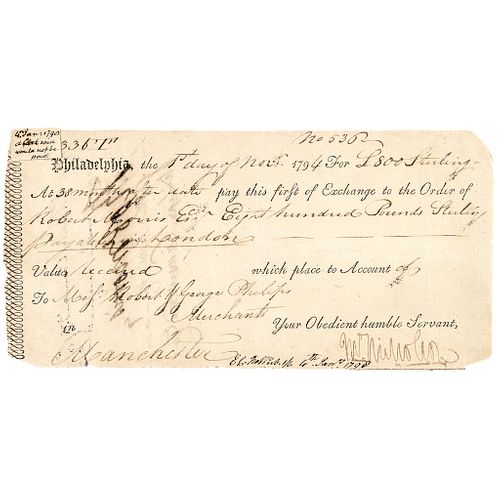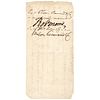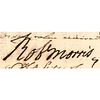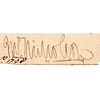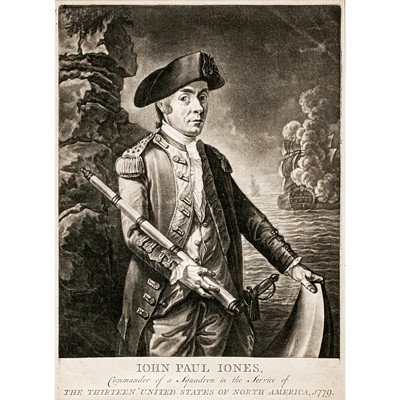1794 ROBERT MORRIS Signed Financial Payment Draft Magnificently Endorsed
Lot 36
Categories
Estimate:
$1,000 - $1,400
Absentee vs Live bid
Two ways to bid:
- Leave a max absentee bid and the platform will bid on your behalf up to your maximum bid during the live auction.
- Bid live during the auction and your bids will be submitted real-time to the auctioneer.
Bid Increments
| Price | Bid Increment |
|---|---|
| $0 | $10 |
| $200 | $20 |
| $300 | $25 |
| $500 | $50 |
| $1,000 | $100 |
| $2,000 | $200 |
| $3,000 | $250 |
| $5,000 | $500 |
| $10,000 | $1,000 |
| $20,000 | $2,000 |
| $30,000 | $2,500 |
| $50,000 | $5,000 |
| $100,000 | $10,000 |
| $200,000 | $20,000 |
| $300,000 | $25,000 |
| $500,000 | $50,000 |
About Auction
By Early American History Auctions
Jan 23, 2021
Set Reminder
2021-01-23 12:00:00
2021-01-23 12:00:00
America/New_York
Bidsquare
Bidsquare : Early American History Auction of Autographs, Americana, Political & Maps
https://www.bidsquare.com/auctions/early-american-history-auctions/early-american-history-auction-of-autographs-americana-political-maps-6311
311 Lots of Rare, Historic Autographs, Americana, Civil War Era, George Washington, Abraham Lincoln, Slavery & Black History, Revolutionary War Era, Colonial America, Federal Period, War of 1812, Colonial Currency, Indian Peace Medals & more... Early American History Auctions auctions@earlyamerican.com
311 Lots of Rare, Historic Autographs, Americana, Civil War Era, George Washington, Abraham Lincoln, Slavery & Black History, Revolutionary War Era, Colonial America, Federal Period, War of 1812, Colonial Currency, Indian Peace Medals & more... Early American History Auctions auctions@earlyamerican.com
- Lot Description
Autographs
Robert Morris Signer of the Declaration of Independence, the Articles of Confederation & US Constitution Payment
ROBERT MORRIS (1734-1806). Signer of the Declaration of Independence, the Articles of Confederation, and the United States Constitution, Patriot of the American Revolutionary War and known as the "Financier of the Revolution," United States Senator from Pennsylvania.
November 8, 1794-Dated Federal Period, Partly-Printed Document Signed, "Robt Morris," Endorsed on back, measuring 8" x 4", at Philadelphia, Very Fine. This being Payment Draft No. 536 issued in the amount of 800 Pounds Sterling payable "to the Order of Robert Morris Esq." in London by way of Major Robert G. George Philips, Merchants in Manchester. This financial Draft is also Signed, "John Nicholson" in the bottom right corner. The reverse is magnificently endorsed "Robt Morris" in vivid bold deep brown, his signature measuring 2.75" long and at points over 1" tall causing some modest show-through to the face and a bit of unobtrusive ink burn in one letter the "o" of the signature. Robert Morris signature is so boldly delineated that it is a highlight stretching mostly across the width of the paper. This Draft is decorated by ornate looping braid designs along the left edge, otherwise normal wear from use. A rarely encountered style of Payment Draft signed by the "Financier of the American Revolution".
Robert Morris (1734-1806) was born in Liverpool, England but emigrated to the colonies as a teenager to assist his tobacco planter father in Maryland. Morris served first as an apprentice to the Philadelphia mercantile firm of Charles Willing, but later as a full business partner at age 24. Willing, Morris & Co. successfully managed a thriving import and export trade from and to the Caribbean, Europe, the Middle East, and India.
The Stamp Act (1765-6) first interested merchant Morris in politics, and he served as a Pennsylvania delegate to the Continental Congress in 1775. He was one of nine Pennsylvania delegates who signed the Declaration of Independence. Morris was a significant financier of the Revolutionary war effort, donating incredible sums of money to pay Washington's troops during a time when American currency still had no value. In addition to providing these Morris-endorsed "Morris notes", the generous merchant also gifted some of his mercantile fleet to the American navy. Morris also used his extensive merchant networks to gather intelligence for the Patriots.
In 1778, Morris signed the Articles of Confederation. Morris's commitment to the Revolutionary cause was recognized upon his appointment to Superintendent of Finance from 1781-1784. In later life, Morris's overextension of his personal wealth during the Revolutionary War, several dubious business projects, and the construction of an elegant L'Enfant-designed Philadelphia mansion dubbed "Morris's Folly" eventually led to his bankruptcy and imprisonment for debt.
In 1798, just four years after this check was issued, Morris was confined in the Prune Street Prison in Philadelphia. He would languish here for another three years before the passage of the Bankruptcy Act of 1800 would pave the way for his release.
- Shipping Info
-
Early American provides in-house worldwide shipping. Please contact us directly if you have questions about your specific shipping requirements.
-
- Buyer's Premium



 EUR
EUR CAD
CAD AUD
AUD GBP
GBP MXN
MXN HKD
HKD CNY
CNY MYR
MYR SEK
SEK SGD
SGD CHF
CHF THB
THB